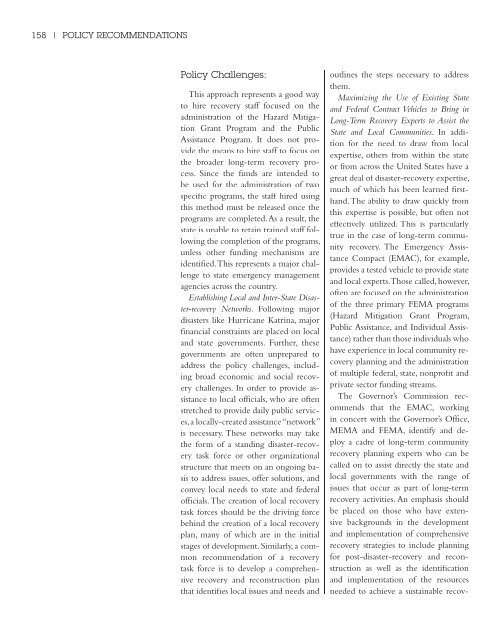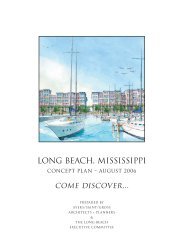Reports - Mississippi Renewal
Reports - Mississippi Renewal
Reports - Mississippi Renewal
- No tags were found...
Create successful ePaper yourself
Turn your PDF publications into a flip-book with our unique Google optimized e-Paper software.
158 | POLICY RECOMMENDATIONSPolicy Challenges:This approach represents a good wayto hire recovery staff focused on theadministration of the Hazard MitigationGrant Program and the PublicAssistance Program. It does not providethe means to hire staff to focus onthe broader long-term recovery process.Since the funds are intended tobe used for the administration of twospecific programs, the staff hired usingthis method must be released once theprograms are completed. As a result, thestate is unable to retain trained staff followingthe completion of the programs,unless other funding mechanisms areidentified. This represents a major challengeto state emergency managementagencies across the country.Establishing Local and Inter-State Disaster-recoveryNetworks. Following majordisasters like Hurricane Katrina, majorfinancial constraints are placed on localand state governments. Further, thesegovernments are often unprepared toaddress the policy challenges, includingbroad economic and social recoverychallenges. In order to provide assistanceto local officials, who are oftenstretched to provide daily public services,a locally-created assistance “network”is necessary. These networks may takethe form of a standing disaster-recoverytask force or other organizationalstructure that meets on an ongoing basisto address issues, offer solutions, andconvey local needs to state and federalofficials. The creation of local recoverytask forces should be the driving forcebehind the creation of a local recoveryplan, many of which are in the initialstages of development. Similarly, a commonrecommendation of a recoverytask force is to develop a comprehensiverecovery and reconstruction planthat identifies local issues and needs andoutlines the steps necessary to addressthem.Maximizing the Use of Existing Stateand Federal Contract Vehicles to Bring inLong-Term Recovery Experts to Assist theState and Local Communities. In additionfor the need to draw from localexpertise, others from within the stateor from across the United States have agreat deal of disaster-recovery expertise,much of which has been learned firsthand.The ability to draw quickly fromthis expertise is possible, but often noteffectively utilized. This is particularlytrue in the case of long-term communityrecovery. The Emergency AssistanceCompact (EMAC), for example,provides a tested vehicle to provide stateand local experts. Those called, however,often are focused on the administrationof the three primary FEMA programs(Hazard Mitigation Grant Program,Public Assistance, and Individual Assistance)rather than those individuals whohave experience in local community recoveryplanning and the administrationof multiple federal, state, nonprofit andprivate sector funding streams.The Governor’s Commission recommendsthat the EMAC, workingin concert with the Governor’s Office,MEMA and FEMA, identify and deploya cadre of long-term communityrecovery planning experts who can becalled on to assist directly the state andlocal governments with the range ofissues that occur as part of long-termrecovery activities. An emphasis shouldbe placed on those who have extensivebackgrounds in the developmentand implementation of comprehensiverecovery strategies to include planningfor post-disaster-recovery and reconstructionas well as the identificationand implementation of the resourcesneeded to achieve a sustainable recov-




